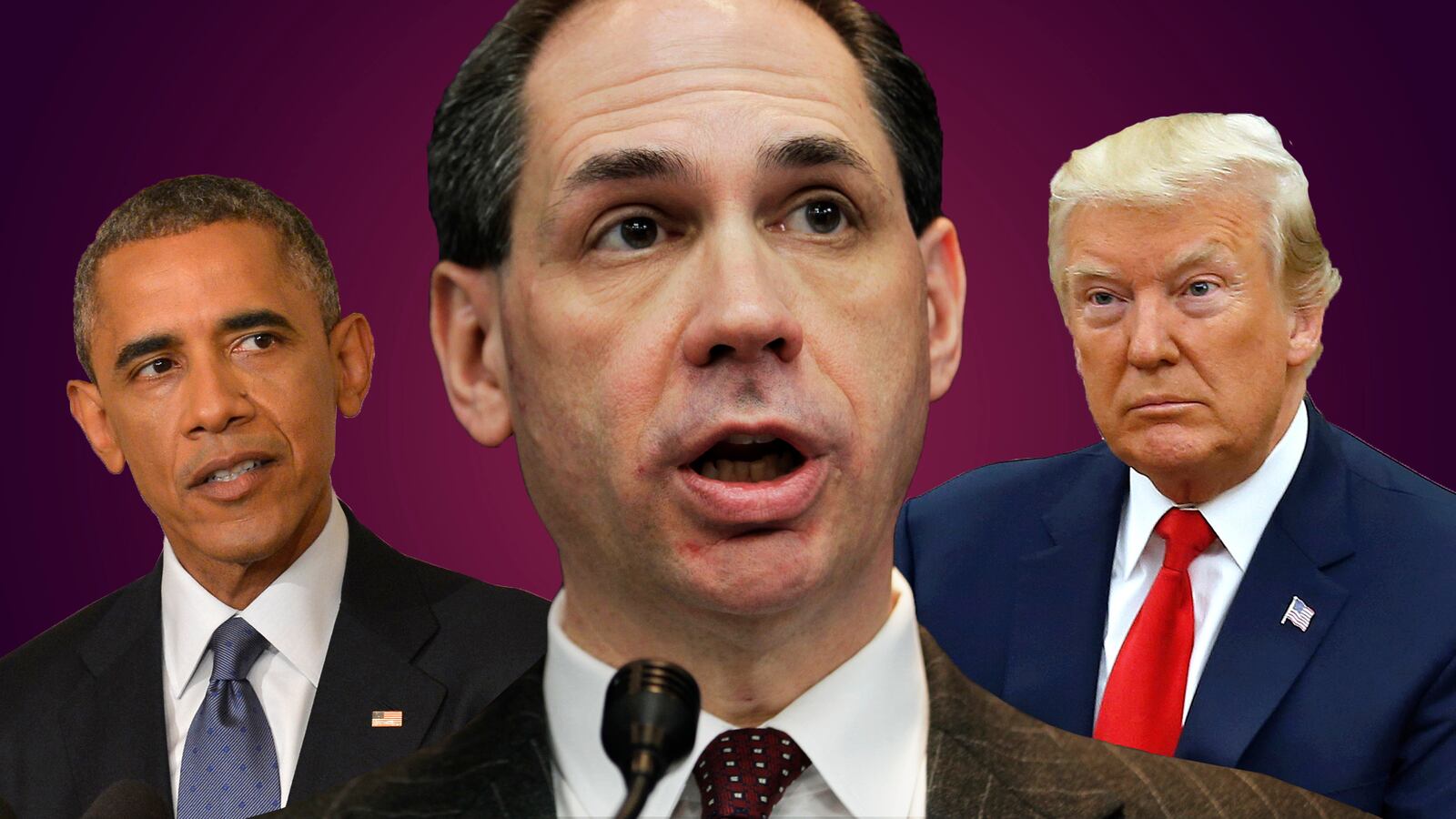Just last year, Timothy Reif was a champion of the Obama administration’s free trade agenda. Today, he’s working for an administration that’s out to destroy it.
Reif leads international compliance and enforcement efforts as a senior adviser to the U.S. Trade Representative. That makes him one of the highest-ranking trade policy officials in the Trump administration, which is vehemently hostile to landmark international trade deals.
It’s a complete 180 for Reif and his former colleagues couldn’t be more shocked and dismayed.
“We thought it was outrageous the way [Trump] went after the career people who have dedicated their lives to some of this stuff,” one former USTR official said. “Agreeing to stay on and work in this administration is pretty unforgivable. And to stay on at USTR after what Trump said on the campaign trail is crazy.”
It’s not uncommon for incoming administrations to keep top ranking officials from past administrations, even when those officials hail from opposing political parties. Nor is it unheard of for a political appointee to suppress his or her personal beliefs in service of some broader, governmental mission. But the degree to which Reif has crossed the partisan divide, has struck former colleagues as uniquely indifferent to actual ideology.
For Trump, too, the fit is an odd one, as his administration is now relying on a high-ranking official to execute one of its top-tier policies after that official just helped run a policy in the direct opposite direction. Democratic sources have speculated that Reif’s continued presence at the USTR shows that Trump may never have been invested in the anti-trade-deal positions he espoused. But Reif’s former colleagues doubt that he stayed on to try to limit the rollback of Obama era trade gains. Most suspect he just wanted to keep a high-level administration post.
“The general impression was that he was either trying to keep his job or trying to get a promotion,” said a second former USTR official. “There was not a lot of principle.”
In his current post, Reif oversees compliance and enforcement for “all U.S. trade and investment agreements,” according to his official bio.
Trump has blasted Obama administration trade policy. One of his first actions as president was to withdraw the U.S. from the Trans-Pacific Partnership, a landmark Asian free trade deal that Obama’s USTR spent years negotiating.
When Reif was USTR’s general counsel under Obama, he publicly defended that trade deal, backed the Obama administration efforts to enforce U.S. trade pacts, and more generally promoted the administration’s view of free trade as a net benefit for American businesses and consumers.
“These agreements are terribly important,” Reif said about a month after Trump declared his presidential candidacy. Trade deals such as the TPP are “so essential to the development of businesses and jobs in the United States.” The TPP in particular, Reif said, “will have such a multiplicity of important benefits in different ways.”
Reif also lamented political rhetoric that, he suggested, obscures the benefits of such trade deals. “In any debate, there are going to be misconceptions that arise, and it’s our job to try to prevent that and when it occurs to try to correct it, and I see that as a necessary job,” he said.
When Reif told colleagues, on the eve of the presidential transition, that he would be staying on board, they were stunned that he’d provide services to a new administration that, they felt, grossly misrepresented TPP and other trade agreements.
“It was shocking, given how Trump characterized the trade representative during the campaign, that he’d want to stay,” said the second former senior USTR officials, who, along with others, spoke to The Daily Beast on condition of anonymity. “A lot of people are upset he’s still there.”
Reif did not respond to a request for comment, nor did USTR or the Trump White House.
Since Trump took office, Trade Representative Robert Lighthizer and his staff have become a vanguard for the administration’s aggressive push to crackdown on what Trump has characterized as unfair trade deals that subordinate U.S. economic interests to those of its foreign competitors.
Withdrawing from TPP was a major step in that agenda, and one that reversed a major Obama administration policy goal. Trump is now eyeing a renegotiation of—or even complete withdrawal from—the North American Free Trade Agreement, another landmark trade pact.
“Too many Americans have been hurt by closed factories, exported jobs, and broken political promises,” Lighthizer said in a statement last month on the release of administration goals for NAFTA renegotiation. “Under President Trump’s leadership, USTR will negotiate a fair deal.”
If the administration does roll back NAFTA, it will likely be reversing provisions of the deal hammered out by Reif himself. According to his USTR biography, Reif was the “lead USTR negotiator for key provisions” of NAFTA and other free trade pacts.
He was also deeply involved in the push for TPP, and defended the trade deal against Trump-esque critiques that it would disadvantage American workers. Reif called it a “historic agreement” that “boosts Made-in-America exports, supports higher-paying American jobs, and levels the playing field so that Americans can compete and win in the global economy.”
Obama-era USTR staffers were deeply invested in negotiating and enacting TPP, and many of them took Trump’s criticism personally. “All the Obama USTR people are so pissed he agreed to stay,” said the first former USTR official.






